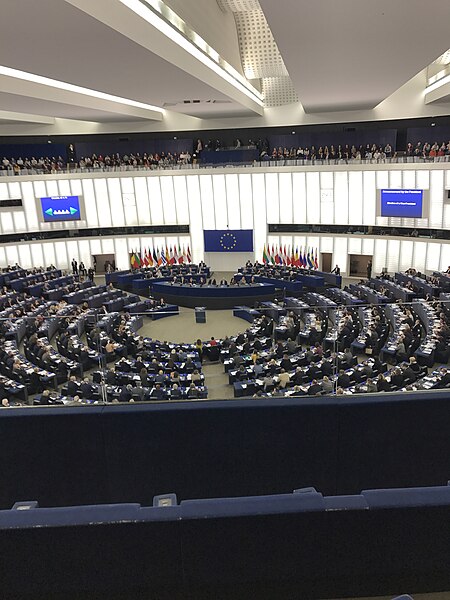
Supporters of the French far-right National Rally party cheer following their victory.
At past EU leaders’ summits in Brussels, Emmanuel Macron has often been accused of trying to steal the limelight. On Sunday night, he certainly managed that, though perhaps not in the way he’d have liked.
As votes for the European Parliament were still being counted, headlines were dominated by Macron’s drubbing by French hard-right nationalists. The shock came when he decided to dissolve France’s national parliament in response. This move, although considered last year after a poor general election showing, was unexpected now.
Macron’s gamble, made from a position of weakness, could force him to work with a French prime minister from the Eurosceptic far right after the snap general election set for June 30 and July 7. Marine Le Pen, often portrayed as his political nemesis, declared her party ready to govern. While France has seen presidents and prime ministers from different parties before, a far-right prime minister would be unprecedented.
Le Pen has worked to broaden her party’s appeal and soften its extremist image. She hopes this EU-level victory (her National Rally party garnered more than double the votes of Macron’s Renaissance party) will lead to significant wins in the snap election. Her dream is that this success could bring her, or her popular protégé Jordan Bardella, closer to the French presidency, a goal she has repeatedly pursued unsuccessfully. The next presidential election in France is scheduled for 2027.
In this European Parliament election, the hard right and nationalist right made gains across the EU, driven by voter concerns about migration, inflation, and environmental reform costs. However, their ability to influence future EU policy remains uncertain. Centrist parties still hold the majority of seats in the EU chamber where laws are debated and passed.
For the hard-right parties to have real impact, they must unite despite differing national priorities and deep-seated differences, such as their stance on supporting Ukraine against Russia.
One area where the hard right has already made an impact is environmental reform. The EU, ambitious about leading in climate action, has seen its green parties lose 20 seats. The cost-of-living crisis has made taxpayers increasingly resistant to new environmental rules. Farmers’ protests against these rules have been leveraged by the hard right to position themselves as champions against "remote elites" in Brussels and national governments. This pressure has led to the watering down or rescinding of several EU environmental regulations, including pesticide rules.
Predicting the future influence of the nationalist right in the EU is challenging. Labels are often not helpful, as some hard-right nationalists become more mainstream to attract voters, while centre-right politicians adopt far-right language on issues like migration and the environment to retain supporters. Overall, the centre-right won the most seats and made the largest gains in the European Parliament, though this fact may be less eye-catching than debates about far-right gains.







































